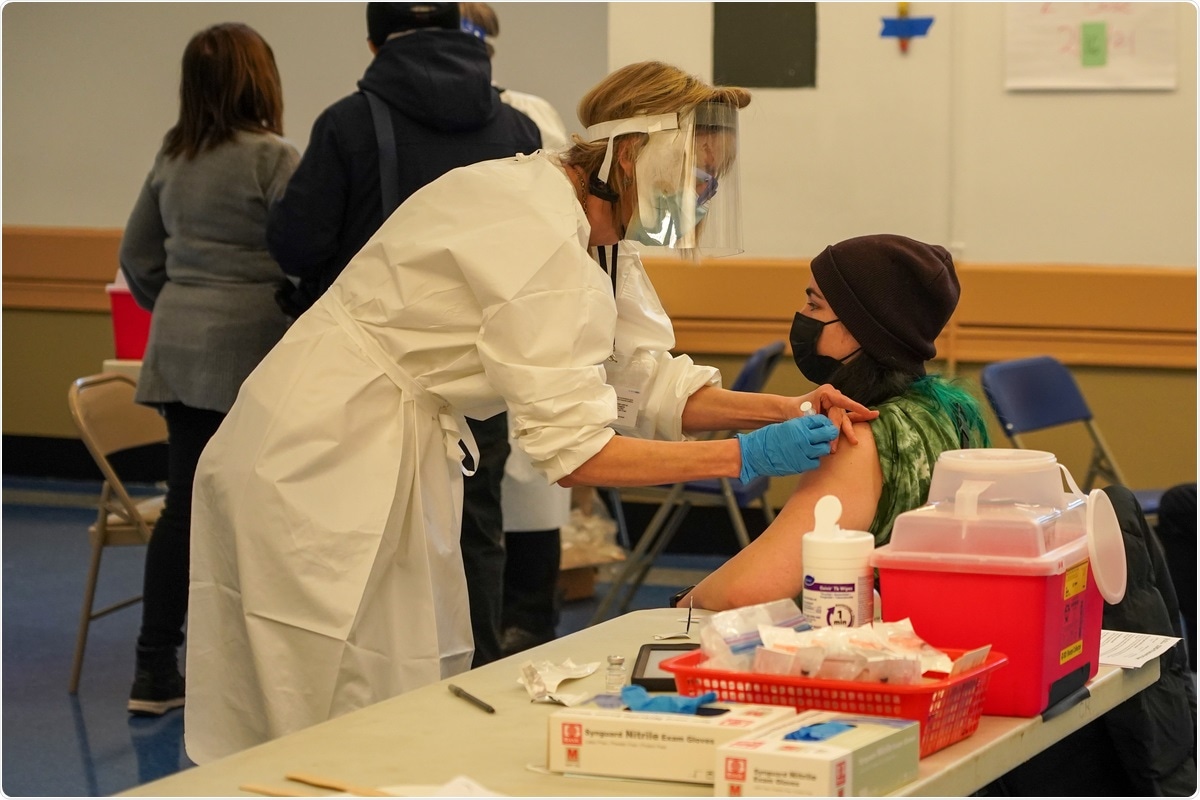A new preprint available on the preprint server medRxiv* assessed vaccine effectiveness in 8.8 million people in New York six months after vaccination. Findings led by researchers from the New York State Department of Health in Albany found an overall decline in vaccine effectiveness with the emergence of the Delta variant.
 Study: COVID-19 Vaccine Effectiveness by Product and Timing in New York State. Image Credit: Leonard Zhukovsky/ Shutterstock
Study: COVID-19 Vaccine Effectiveness by Product and Timing in New York State. Image Credit: Leonard Zhukovsky/ Shutterstock
Vaccine effectiveness against hospitalization declined but remained over 90% protective for adults under 65. However, a modest drop in protection was observed in people 65 and older.
The drop in vaccine effectiveness in both infection and hospitalization supports booster shots for adults 65 and older.
The study
Vaccinated individuals experience fewer infections and hospitalizations than the unvaccinated
The number of coronavirus disease 2019 (COVID-19) cases in New York dropped from May 1 through late June. But as Delta spread, so did the number of cases. Unvaccinated people continued to have the highest rate of infection from the Delta variant. Vaccine effectiveness did decline in the presence of Delta. Vaccine effectiveness was lowest around July 10 when 85.3% of the Delta variant circulated across New York.
The researchers evaluated Delta's effects on vaccine effectiveness in preventing infection and hospitalization. Of the 8,834,605 adults examined in the study, 65.5% were fully vaccinated. Amongst the fully vaccinated, 48.6% received the Pfizer-BioNTech vaccine, 41.5% received Moderna, and 10% received the Johnson & Johnson vaccine.
There were 38,778 COVID-19 cases in fully vaccinated people compared to the 116,314 COVID-19 cases in unvaccinated people. About 2,363 fully vaccinated people required hospital admittance compared to 38,778 hospitalizations in unvaccinated people.
Decline of SARS-CoV-2 protection in young adults
Initially, the Pfizer-BioNTech vaccine produced a 93.6% protection against SARS-CoV-2 in young adults (18-49 years old). But from May 1 to July 10, vaccine effectiveness declined 27.8%. Though by the last week of August, vaccine effectiveness increased by 3.2%.
The Moderna vaccine decreased 19.3% from its original 96.5% and increased over time by 1.3%. The Johnson & Johnson vaccine had an 89.4% vaccine effectiveness which decreased by 37.7%. However, it later increased by 18.5%.
Decrease in vaccine effectiveness in adults aged 50 to 64 years
The two-dose Pfizer-BioNTech vaccine originally had 95.3% protection for adults 50 to 64 years old. From May 1 to July 10, older adults showed reduced vaccine effectiveness of 23.8%. By August 28, vaccine effectiveness increased by 4.7%.
The Moderna vaccine had a 97.4% vaccine effectiveness. But the emergence of Delta decreased protection by 11.6% and dropped even further by 2.9% in the last week of August. The Johnson & Johnson vaccine showed an original 86.8% protection against severe acute respiratory syndrome coronavirus 2 (SARS-CoV-2). A 14.2% reduction was observed in the presence of Delta. However, vaccine effectiveness increased by 3.4%.
Older adults had reduced vaccine effectiveness against Delta
People over 65 showed a 12.7% decrease from the 91.9% protection offered from the Pfizer-BioNTech vaccine from May 1 to July 10. By August 28, vaccine effectiveness reduced further by 1.4%.
Moderna's vaccine effectiveness reduced by 9% from 96.2% and showed a further reduction of 2.9% later in the summer. The Johnson & Johnson shot showed a 2.4% decrease from the original 81.7% vaccine effectiveness. An additional 8.4% decrease in vaccine effectiveness was observed by August 28.
mRNA vaccines were 90% effective in preventing hospitalization in adults aged 18 to 64 years
Vaccine protection against hospitalization declined among vaccinated and unvaccinated individuals. Unvaccinated individuals and people over the age of 65 were the groups with the highest hospitalization rates.
People who were 18 to 49 and 50 to 64 vaccinated with either of the mRNA vaccines continued to show over 90% protection against hospitalization (except June, when Moderna showed 87.3% vaccine effectiveness in people 18 to 49 years).
People 18 to 49 years with the Johnson & Johnson vaccine showed over 90% protection in preventing hospitalization (except in June, when vaccine effectiveness declined to 53.7%).
People aged 50 to 64 who were fully vaccinated with the Johnson & Johnson vaccine had 86.6% to 93.3% protection against requiring hospital admittance.
All vaccinated individuals over 65 years showed small declines in protection against hospitalization. People with the Johnson & Johnson shot showed the lowest vaccine effectiveness (80.5%-90.4%) in preventing hospitalization.
*Important Notice
medRxiv publishes preliminary scientific reports that are not peer-reviewed and, therefore, should not be regarded as conclusive, guide clinical practice/health-related behavior, or treated as established information.
- Rosenberg, E. et al. (2021) "COVID-19 Vaccine Effectiveness by Product and Timing in New York State". medRxiv. doi: 10.1101/2021.10.08.21264595.
Posted in: Medical Science News | Medical Research News | Disease/Infection News
Tags: Coronavirus, Coronavirus Disease COVID-19, Hospital, Respiratory, SARS, SARS-CoV-2, Severe Acute Respiratory, Severe Acute Respiratory Syndrome, Syndrome, Vaccine

Written by
Jocelyn Solis-Moreira
Jocelyn Solis-Moreira graduated with a Bachelor's in Integrative Neuroscience, where she then pursued graduate research looking at the long-term effects of adolescent binge drinking on the brain's neurochemistry in adulthood.
Source: Read Full Article